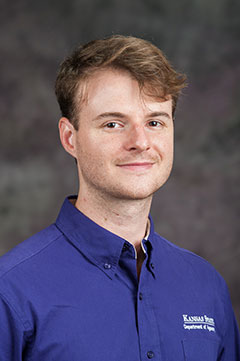September 12, 2016
Visiting scholar receives $50K fellowship for doctoral work in agriculture, STEM

A Kansas State University scholar received a $50,000 Monsanto STEM Fellowship.
Santiago Tamagno, Rosario, Argentina, a visiting scholar with the Kansas State University Crop Team, is one of four doctoral candidates nationwide to receive the award, which is presented to high-achieving minority graduate students pursuing degrees in agriculture or science, technology, engineering and math, or STEM.
"This award not only brings the opportunity for me to start my doctoral studies advised by Dr. Ciampitti in the agronomy department but also provides funding for critical lab research equipment," Tamagno said. "As a young researcher, this recognition keeps me motivated and focus in my goals. In addition, it represents a responsibility and a commitment to my work, to maintain and improve expertise and academic dedication to the discipline of crop science."
The crop team is led by Ignacio Ciampitti, assistant professor of crop production and cropping systems.
Tamagno's doctoral research will focus on soybeans. The aim of his project is to understand and characterize biological nitrogen fixation and how this process is affected through different production practices in the United States. Additionally, the project will represent different scales of work from plant-level to regional characterization and evaluation of management practices such as genotype selection or nitrogen fertilization with physiological processes determinant of seed yield. Main implications of this work will be reflected through better resource use-efficiency — e.g., nutrient fertilization — and technical assessment to farmers and companies.
According to Monsanto, about 25,000 agricultural jobs go unfulfilled each year because of a lack of qualified applicants. Modern agriculture encompasses more than farming — and represents a convergence that demands a variety of skills, including STEM.
"Many graduate and undergraduate students, especially high achievers form underrepresented communities, are unaware that their career paths could include jobs in agriculture or related industries," said Steve Mizell, executive vice president of human resources for Monsanto. "These scholarships enforce Monsanto's commitment to building an innovative workforce that is able to meet the demands of feeding a growing global population of 9 billion people by 2050."
